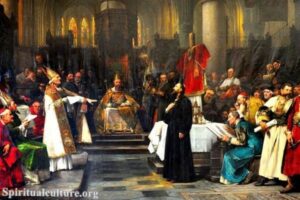Protestantism, a major branch of Christianity, has played an instrumental role in shaping the religious landscape of many Western countries. However, it has had a particularly rich and complex history in one country in particular – France.
This article will delve into the profound influence and the intricate history of Protestantism in France, tracing its roots from the Reformation period to its present-day status.
Protestantism in France: The Early Years
The story of Protestantism in France begins during the era of the Reformation in the 16th century. The Reformation, a religious movement that swept across Europe, was initiated by Martin Luther in Germany but quickly spread to other regions, including France. The main objective of the Reformation was to challenge the teachings and the authority of the Roman Catholic Church, which was the dominant religious institution at the time.
In France, the Reformation was led by John Calvin, a native Frenchman who was heavily influenced by Luther’s teachings. Calvin established the French Reformed Church, marking the birth of Protestantism in France. This new religious movement, however, was not welcomed by the Catholic-dominated French monarchy.
The French Wars of Religion
The rise of Protestantism in France led to a series of violent conflicts known as the French Wars of Religion, which lasted from 1562 to 1598. These wars were primarily between the French Catholics and the Huguenots, the name given to the French Protestants. Despite constituting a minority, the Huguenots were a powerful political force and were supported by influential French nobles.
The Edict of Nantes, signed in 1598 by King Henry IV, brought an end to these wars. This edict granted the Huguenots significant rights, including freedom of worship, and marked a turning point in the history of French Protestantism.
Revocation of the Edict of Nantes and the Huguenot Diaspora
Unfortunately, the peace was short-lived. In 1685, King Louis XIV revoked the Edict of Nantes and declared Protestantism illegal. This led to a mass exodus of Huguenots from France, with many fleeing to Protestant-friendly countries like the Netherlands, England, and Prussia. This period, known as the Huguenot diaspora, profoundly impacted the spread of French culture and Protestantism across Europe.
Protestantism in Modern France
In modern times, Protestantism in France has seen a resurgence. The French Protestant Church, known as the United Protestant Church of France, was established in 2013 as a union of the Reformed Church of France and the Evangelical Lutheran Church of France.
Today, Protestants make up a small but significant minority in France. They are known for their strong emphasis on education and social service and have made significant contributions to French society in various fields, including education, healthcare, and politics.
Conclusion: The Legacy of Protestantism in France
In conclusion, Protestantism has a rich and complex history in France. From its origins in the Reformation to its present-day status, it has faced persecution, diaspora, and resurgence. Despite these challenges, it has continued to shape France’s religious, social, and cultural landscape. The legacy of Protestantism in France is one of resilience, influence, and enduring faith.


